Arthur O’Donnell landed his job at the New Mexico Public Regulation Commission through the Energy Innovator Fellowship, where he now mentors other fellows. Read the interview about how CEIF shaped his career path.
Office of Energy Efficiency & Renewable Energy
February 21, 2024When Arthur O’Donnell was in college studying communications, he wanted to work in media. What he didn’t know was that his journalism career would lead him to become a champion for New Mexico’s energy transition.
Meandering paths to energy careers are not uncommon, and the industry benefits greatly from the diversity of backgrounds and skills it attracts. That’s why the U.S. Department of Energy (DOE) creates and supports programs that open doors for students, recent grads and established professionals seeking energy jobs. The Energy Innovator Fellowship (EIF) is one of these programs, funding Fellows to spend up to two years supporting projects at critical energy organizations.
O’Donnell arrived at the New Mexico Public Regulation Commission (NM PRC) as a Fellow in 2020. After completing his two-year fellowship, he was hired as the Director of Policy Administration to help develop innovative ways to integrate solar power and distributed energy resources with the state's electric grid. O’Donnell now mentors a CEIF Fellow himself at NM PRC, passing down the opportunities and learnings he gained.
“What I find most exciting is energizing people around change,” O’Donnell said. “Having younger staff at long-standing energy institutions is helpful. They see what can be accomplished, and they’re motivated to contribute to progress in the areas they care about.”
In this interview, O’Donnell reflects on his career, the value of mentorship, and why now is the time to take advantage of unprecedented Federal funding and resources aimed at energy jobs.
What was your previous experience with renewable energy work prior to the fellowship?
Looking back, diversification of the energy mix has always been a part of my jobs. My interest was sparked when I became a radio news reporter in the 1970s and covered Washington state’s plans to build five nuclear power plants. By the 80’s, I was covering the infancy of renewable energy regularly. I loved being close to this zeitgeist of change, and my career as an energy journalist continued for the next 20 years. The expertise I developed while reporting ultimately landed me a job with the California Public Utilities Commission as a lead analyst, where I helped implement a piece of legislation to get utilities to plan and procure energy storage.
What project(s) did you support during your fellowship?
I did many things focused on rulemaking and implementing policies and programs around grid modernization. My emphasis on stakeholder engagement and alignment helped ensure that the rules had broad support and introduced new participants into the regulatory process. I’ve supported the launch of a 200 MW Community Solar program, substantial updates to utility interconnection rules, and the state requirement for advanced inverter installation. I’m proud to say that New Mexico’s interconnection policy is now a model for other states.
What did you find most valuable about the experience?
It’s challenging for people with non-traditional backgrounds like mine to break into energy policy work; there’s a long line of highly qualified professionals competing for these jobs. The fellowship opened the door to the energy community in New Mexico, where I had just moved. The commissioners needed expert advisory assistance to focus on these types of grid modernization initiatives. My outsider’s perspective allowed me to recommend creative solutions. When change in the commission came, my current position was created, and I was able to continue the work I started.
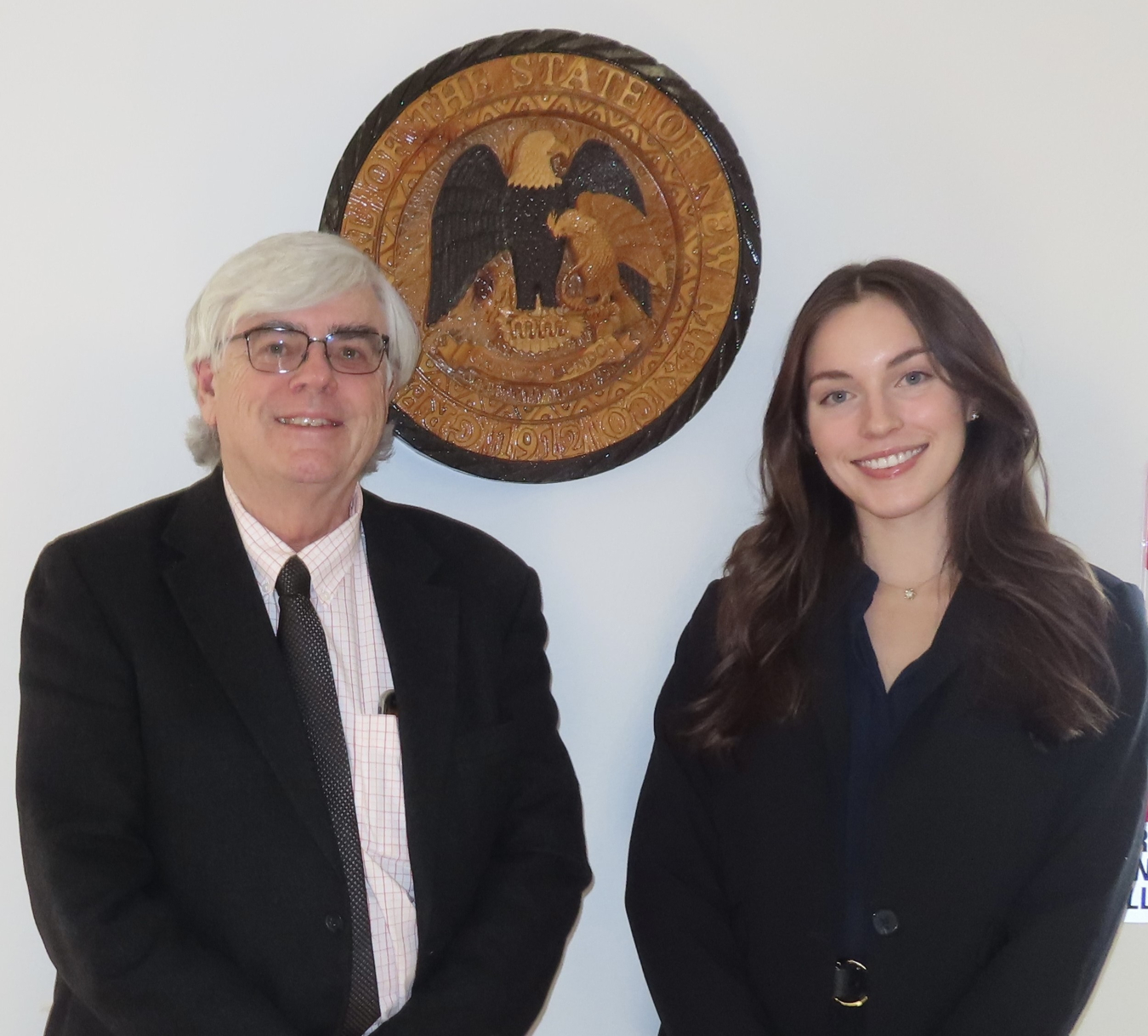
Arthur O’Donnell and PRC’s current Fellow, Meredith Tidwell. Credit: Arthur O’Donnell.
What advice would you give future fellows?
Mostly, I want them to see this as a tremendous opportunity. The fellowship is so educational, and it helps you figure out if this is the career path you want to take. Take advantage of the federal funding and resources designed to provide capacity to states that really need them. Also, use the professional development stipend to advance your skills and expertise. You get $10,000. Spend it wisely, because this may be the only time in your career that you’ll have such a flexible resource.
Interested in participating in Energy Innovator Fellowship? Learn more.
Meet Energy Champions at EERE
-
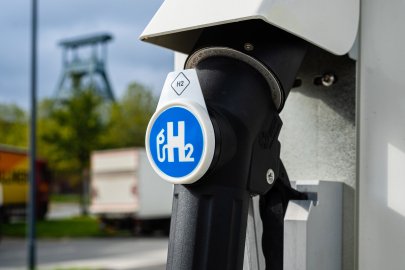 Meet American Energy Innovators Dr. Jennifer Lalli and Courtnay Brand of NanoSonic, Inc. NanoSonic, Inc specializes in the design and manufacture of innovative materials and, with the help of EERE, are driving in the future of hydrogen vehicles.
Meet American Energy Innovators Dr. Jennifer Lalli and Courtnay Brand of NanoSonic, Inc. NanoSonic, Inc specializes in the design and manufacture of innovative materials and, with the help of EERE, are driving in the future of hydrogen vehicles. -
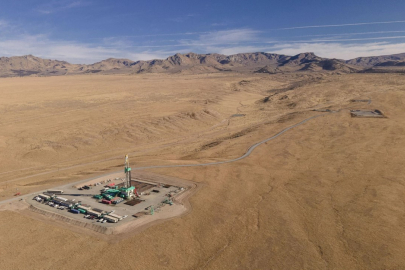 Kevin Jones started his career in the oil and gas industry, but soon found that many of the skills he acquired through his work in oil and gas were transferable to other energy sectors, especially geothermal technologies.
Kevin Jones started his career in the oil and gas industry, but soon found that many of the skills he acquired through his work in oil and gas were transferable to other energy sectors, especially geothermal technologies. -
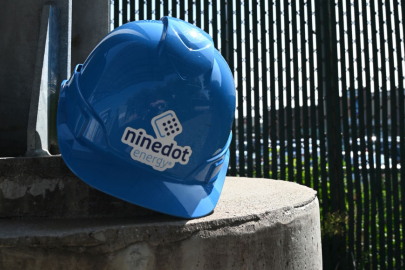 American Energy Innovators David Arfin and Adam Cohen talk about their solar and battery storage company NineDot Energy and the important role EERE played in helping them build the successful business they operate today.
American Energy Innovators David Arfin and Adam Cohen talk about their solar and battery storage company NineDot Energy and the important role EERE played in helping them build the successful business they operate today. -
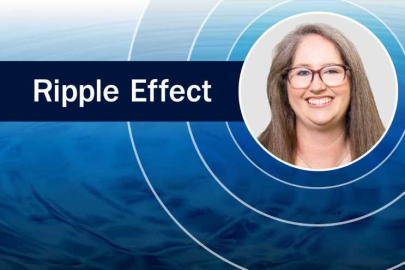 Learn how Kristine Moody, a molecular ecologist at Oak Ridge National Laboratory, developed an intense curiosity about aquatic creatures, leading to a career in water power.
Learn how Kristine Moody, a molecular ecologist at Oak Ridge National Laboratory, developed an intense curiosity about aquatic creatures, leading to a career in water power. -
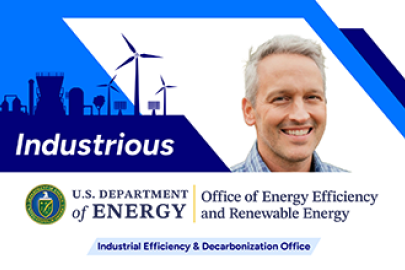 Industrious series: Meet Corey Tyree, who shares in Q&A interview how curiosity led him from a rural town into engineering.
Industrious series: Meet Corey Tyree, who shares in Q&A interview how curiosity led him from a rural town into engineering. -
 DOE and its partners celebrate the installation of a new hydrogen fueling station at Lincoln Financial Field.
DOE and its partners celebrate the installation of a new hydrogen fueling station at Lincoln Financial Field. -
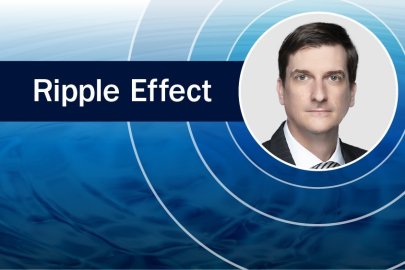 Matthew Grosso, Director of the U.S. Department of Energy’s Water Power Technologies Office, shares how his childhood interest in history and inspiration from Abraham Lincoln led him to become a leader in public service.
Matthew Grosso, Director of the U.S. Department of Energy’s Water Power Technologies Office, shares how his childhood interest in history and inspiration from Abraham Lincoln led him to become a leader in public service. -
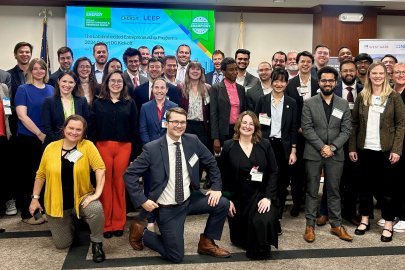 DOE’s Lab-Embedded Entrepreneurship Program (LEEP), managed by AMMTO, welcomed its 2024 cohort to its headquarters in Washington, D.C. to kick off their two-year fellowships
DOE’s Lab-Embedded Entrepreneurship Program (LEEP), managed by AMMTO, welcomed its 2024 cohort to its headquarters in Washington, D.C. to kick off their two-year fellowships -
 Jon-Edward Stokes is Making It! In a Q&A interview, how his shifted his academic focus from English to science and what gives his career purpose.
Jon-Edward Stokes is Making It! In a Q&A interview, how his shifted his academic focus from English to science and what gives his career purpose. -
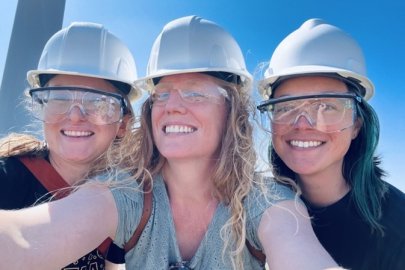 The wind energy workforce is made up of a wide range of people and skills. Learn about the career journey of PNNL lab program manager Alicia Mahon.
The wind energy workforce is made up of a wide range of people and skills. Learn about the career journey of PNNL lab program manager Alicia Mahon.

